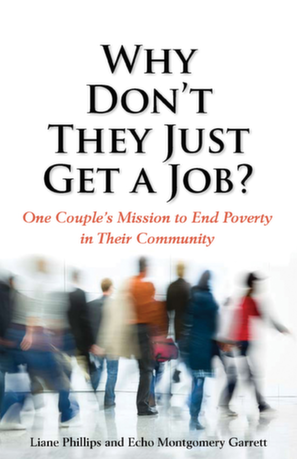 Over the course of 24 years, Cincinnati Works has assisted almost 9,000 families, most from generational poverty, who are working today, with about 60% of them now out of poverty and earning a livable wage.
Over the course of 24 years, Cincinnati Works has assisted almost 9,000 families, most from generational poverty, who are working today, with about 60% of them now out of poverty and earning a livable wage.
Dave Phillips is cofounder of Cincinnati Works and coauthor of Why Don’t They Just Get a Job? In a conversation I had recently with Dave, he told me there are two phases for most people they work with.
Phase 1 is learning to work and moving to stability. This often involves entry-level work in food service, healthcare, cleaning, and other service-sector jobs. The ceiling on wages at that level is about $12 per hour. It usually takes 18 months to two years to get settled in.
Phase 2 is advancement/growth. A person in poverty with two children needs a wage of $22 per hour to be economically self-sufficient. This delta of $10 (the difference between a $22 per hour living wage and the $12 per hour ceiling in the service sector) is a skills delta, so people will have to gain some skills training to achieve self-sufficiency. For a person with children who goes to school part-time while working, it takes 5–6 years.
Individuals are screened for capability, determination to succeed, and willingness to work. Job seekers who are accepted into Cincinnati Works are considered “lifetime members” after they complete Jump Start, which is Cincinnati Works’ soft skills training course. At any time in their life, they can receive support. Dave emphasized that the lifetime membership component has been important for their working success. Cincinnati Works members are assigned a life coach who helps them remove barriers—criminal records, mental health issues, legal issues, financial assistance/education, etc. Sixty percent of job seekers who walk into the Cincinnati Works office do so with chronic depression and/or anxiety.Life skills coaches provide support for setbacks like unexpected health issues, financial crises, relationship issues, etc. Cincinnati Works considers these issues barriers to employment and retention of employment.
A great deal of the success of the program is all of the barrier removals Cincinnati Works has added: Dress for Success, a hospital foundation that provides funding for a mental health coach located in the Cincinnati Works office, St. Vincent de Paul, an employer base of 200+ core employers who hire Cincinnati Works members (some of them are putting Cincinnati Works life coaches into their human resources departments to help them reduce turnover), Cincinnati Legal Aid to help members with legal issues that might keep them from keeping their jobs, and more. As Dave said, “No organization is big enough or has enough money to address all of their issues.”
 To determine who their partners are, Dave asks: “Who is best in the class? Who will treat our members with respect? Who will make a commitment to our members?”
To determine who their partners are, Dave asks: “Who is best in the class? Who will treat our members with respect? Who will make a commitment to our members?”
Dave said one of the biggest problems Cincinnati Works encountered in the first 10 years was all the “silos”—all the nonprofits who refused to work together because they would lose the credit for their efforts or their funding. He would tell them that they could have all of the credit.
Dave told me he thought these were the most important aspects of the success of Cincinnati Works:
- A trusting, lifetime relationship with the members rather than a relationship in which a barrier is removed and then Cincinnati Works believes their job is finished. Dave said the nonprofit world currently treats the symptoms of poverty, not poverty itself. People in poverty face many barriers, and so when one of their problems are solved, they are still in poverty. What they really need is a holistic approach to eliminate poverty in their lives and the lives of their family members.
- Real joint ventures with “best in class” partners who will help with the symptoms of poverty. This includes a commitment to eliminating poverty in the lives of all people in the community who are willing and capable to do the work they must do to accomplish this goal. This creates a committed community who will come together to increase human dignity, remove barriers, and operate outside of their silos.
- Mutuality of trust within a community.
- Establishing a level of trust with the employer base so they know Cincinnati Works brings highly qualified job seekers. Cincinnati Works has two customers who are equally important: job seekers and employers.
- None of this is possible without a highly qualified staff who are committed to help people in poverty become economically self-sufficient. The staff must believe in coaching rather than in doing it for the members, as well as truly believing in the tenacity of the human spirit. This is a rare breed of people in the nonprofit world.
I asked Dave about the role of faith in successfully transitioning out of poverty. To address this need, Cincinnati Works has a chaplain. Dave said, “Hospitals have chaplains. The military has chaplains. Why wouldn’t we?” It is essential to have faith.
When I asked him about return on investment, Dave said that for every $1 they spend, society gets a $3 return in reduced social costs and the contributions the members make in tax dollars, productivity, etc. The real payoff is generational. Dave gave the example of a woman who came to Cinncinati Works for help entering the workforce at 48 years old. Because of her experience with Cincinnati Works, both of her daughters completed college, and their children (her grandchildren) are successful in school.









